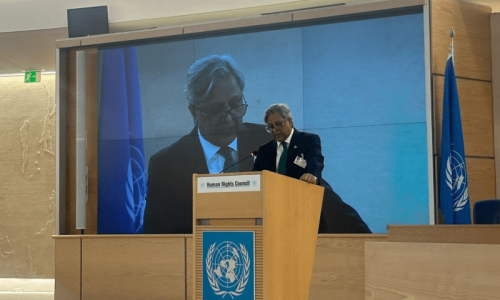BEIRUT, Feb 29: The Hezbollah on Friday slammed Washington’s dispatch of the USS Cole to waters off Lebanon as military interference, as the western-backed government said it did not ask for the warship to be sent.
The condemnation came as pro-government dailies saw sending the vessel as a clear signal to Syria, which is being blamed by the ruling majority for blocking a presidential vote in Beirut.
“This decision proves that it’s the United States which is interfering in Lebanese affairs, and that this interference has taken on a military slant,” Hezbollah MP Hussein Hajj Hassan said.
The United States said on Thursday it had sent the guided-missile destroyer to the waters off Lebanon, which has been embroiled in a paralysing political crisis for months.
It is “a show of support for regional stability” because of “concern about the situation in Lebanon,” a US official said on condition of anonymity, declining to say that the show of force was meant for Syria or Iran.
Prime Minister Fuad Siniora, whose government is backed by the West and most Arab countries, stressed during a meeting with Arab ambassadors that Beirut did not ask for the warship and summoned a top US diplomat for “clarifications.”
“We did not ask anyone to send warships,” Siniora said, adding that no US warship was in “Lebanese waters.”
Earlier Siniora summoned US charge d’affaires Michele Sison “to ask her to clarify the presence of the USS Cole” in the Mediterranean, a government source said.
“Mrs Sison assured him that the warship was in international waters and had been dispatched to guarantee regional stability,” the source added.
Lebanon has been without a president since last November amid political feuding between the western-backed ruling parliamentary majority and the opposition, backed by Syria and Iran.The majority accuses Syria of blocking efforts to elect a new president in Lebanon, which was under Syrian military domination for 29 years until Damascus withdrew its troops in April 2005.
Fears of civil strife in Lebanon have mounted over the continued deadlock and warnings of wider conflict after the Feb 12 assassination in Syria of top Hezbollah commander Imad Mughnieh.
Hezbollah chief Hassan Nasrallah mourned Mughnieh in a massive public rally, threatening “open war” against Israel.
Israel has recently staged war games on the border with Lebanon, reflecting its concern about the threat after the 2006 war against the Shiite militia.
“Wars begin by an exchange of messages. The American decision is the first message to its opponents in the region saying ‘we are here’,” Wehbe Katisha, a retired Lebanese army general, said.
Beirut has also been the scene of recent street clashes between supporters of the rival factions, raising tensions and prompting several Gulf nations and western states to advise their citizens against travelling to Lebanon.
Pro-government daily Al-Mustaqbal said the US deployment was a pointed message to Damascus which showed that “the United States has lost patience with Syria.”
But the pro-Syrian newspaper As-Safir said sending the Cole was a warning that the region faces “new wars which could spread beyond Lebanese borders.” The naval deployment “is aimed at exacerbating the divisions between the Arab countries and pushing them towards war,” it said.
Syria is due to host an Arab summit in March but Arab League chief Amr Mussa has said some states will only attend if the Lebanese crisis is solved, while oil powerhouse Saudi Arabia has yet to receive an official invitation.
The USS Cole was the target of a bombing by Al Qaeda extremists in October 2000 in the Yemeni port of Aden that killed 17 US sailors.—AFP












































